If your videos are flickering, broken, or jerky, watching them can be difficult. Bad or missing video frames lead to similar video playback issues, making the whole experience unpleasant. Everyone wants to fix these bad or missing video frames and get that smooth playback they’re used to.
Luckily, there are many ways you can fix bad or missing video frames. This guide will help you understand the causes of frame loss and help you deal with all frame-related issues with various methods. Follow the steps carefully, and we guarantee you can fix your videos.
Here’s what you need to know.

Understanding the Causes of Frame Loss

Frame loss is a fairly common problem, and it can affect online videos and videos you have on your hard drive. Dropped frames or bad frames are caused by various performance issues, including drivers, device issues, hardware problems, internet problems, errors, viruses, software issues, etc.
In most cases, you won’t be able to determine the exact cause of the problem. Ultimately, it doesn’t matter what the cause is as long as you can deal with the issue. The frame rate or FPS measures how often your graphical system redraws the screen per second.
The RAM, GPU, and CPU all work together and create effects, lighting, and textures that compose frames. When one component has issues, your frames will get lost or corrupted. If the video file is damaged or corrupt, these three might work perfectly, but you still won’t get quality FPS.
Why You Need to Repair Missing and Bad Video Frames
Missing and bad video frames are simply annoying. Just think about the simplest scenario. If you want to watch a movie, you won’t be able to enjoy it because of the missing frames. We are all used to a certain standard of optimal video performance, and none of us can ignore missing frames.
On the other hand, if you record videos for work or edit videos, you want to deliver the best results possible with a smooth experience. You can’t afford to send your clients videos with glitchy frames, which might look unprofessional.
How to Repair Missing and Bad Frames in Videos
Fix 1: Use Video Repair Software (Wondershare Repairit)

-
Repairs corruptions in the recorded video header, sound section, or frames.
-
Repairs corrupted data and errors in the damaged recorded video slider movement.
-
Repair full HD, 4K, and 8K videos and support 20+ popular formats, including MOV, MP4, M2TS, MDT, RSV, WMV, MPEG, DAT, etc.
-
No limit to the number and size of the repairable videos
-
Fix Can't Play Recorded Video on Windows 10/8.1/8/7/Vista and also mac 10.9-10.15.
If your videos are corrupted or damaged in some way, the best option is to use a professional video repair tool like Wondershare Repairit. Download this program and follow these steps:
Step 1: Launch Wondershare Repairit and click + Add to add the video with bad frames.
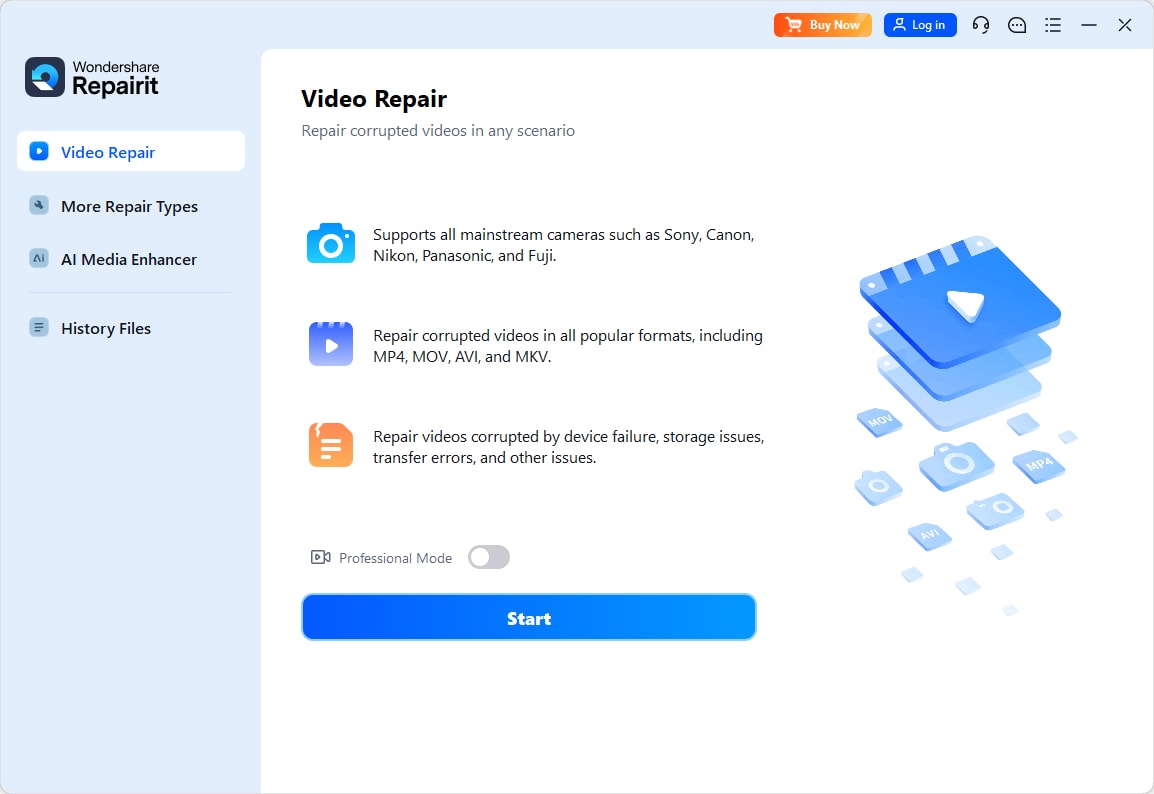
Step 2: Wondershare Repairit will display essential information about the videos. Click Repair in the bottom right corner to start the process.
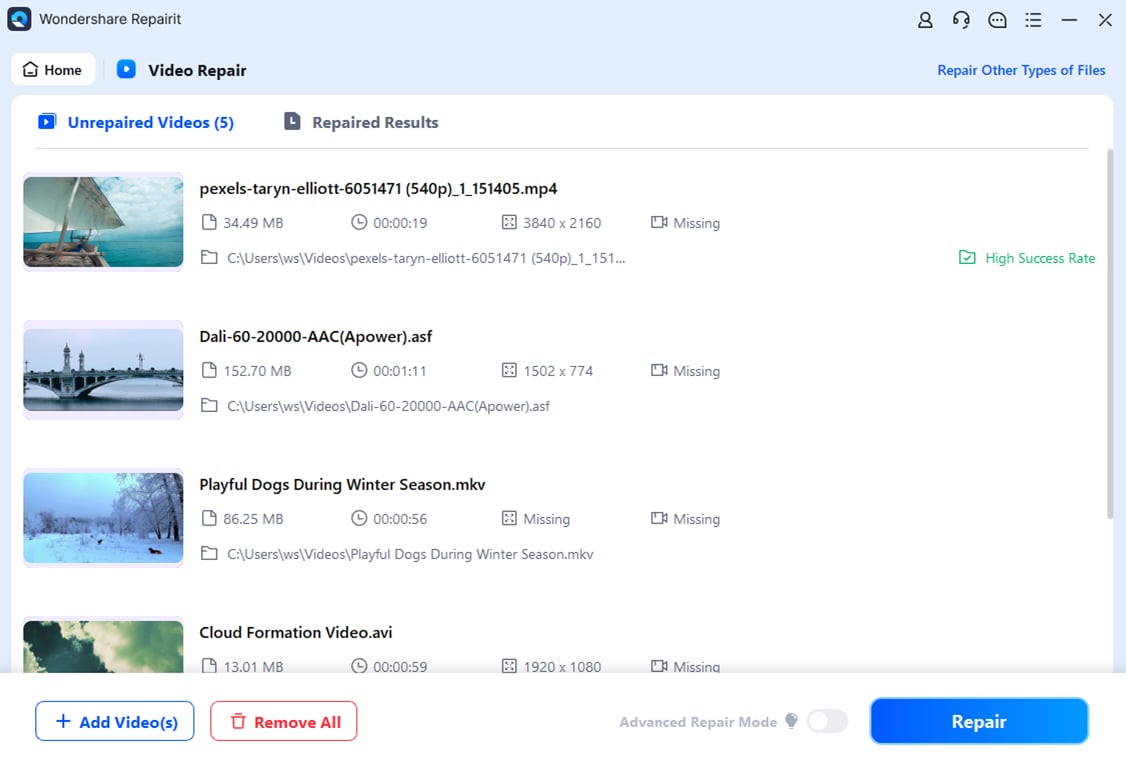
Step 3: After completing the video repair, click OK and Preview to see if the video works normally.
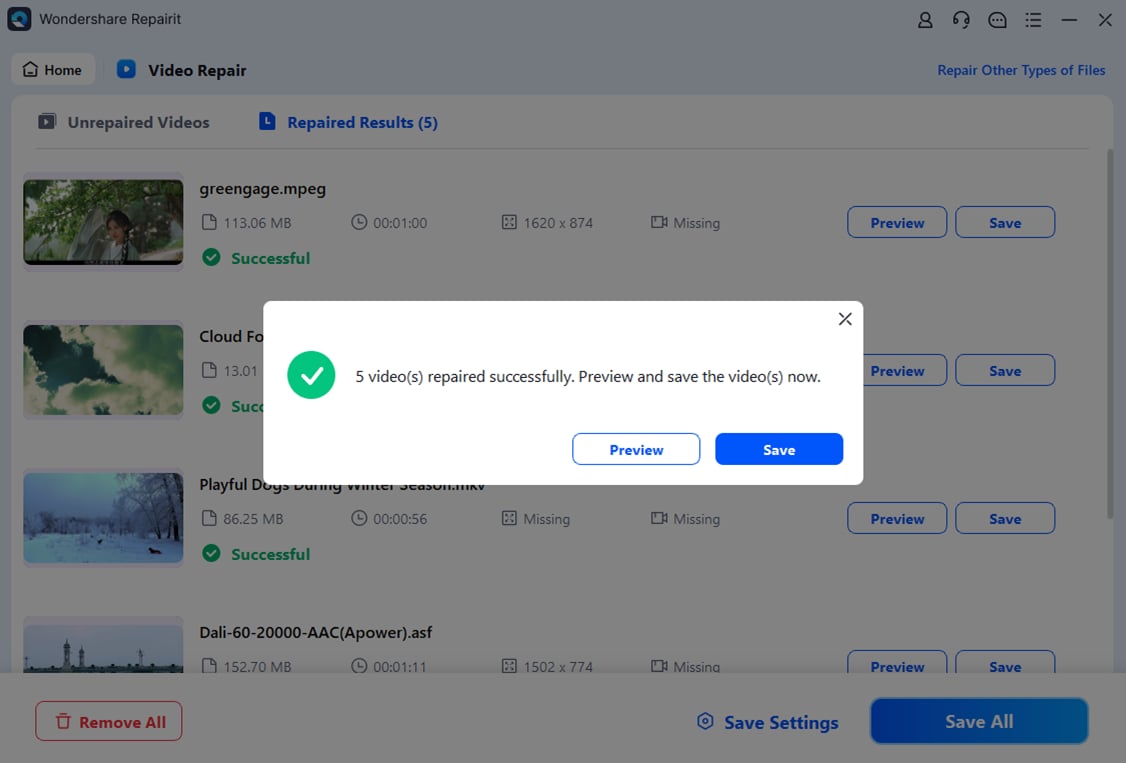
- If you’re satisfied with the results, click Save and select where your videos will be stored.
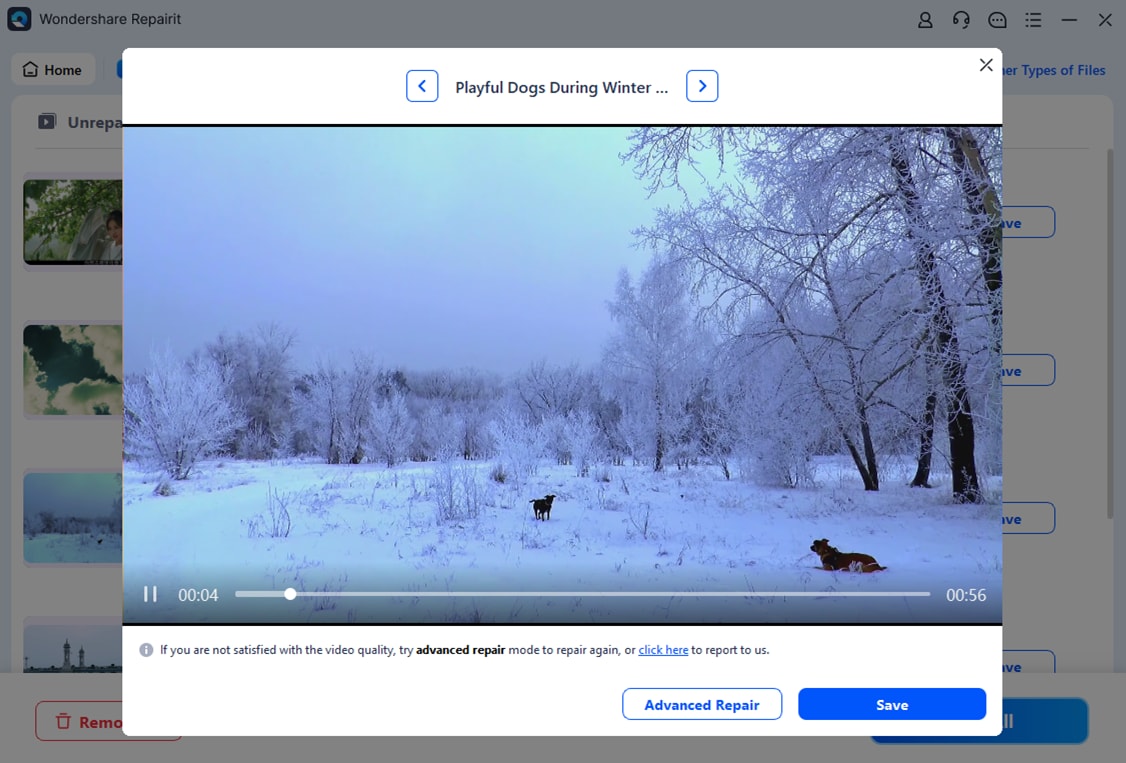
Fix 2: Use FFmpeg to Repair Missing and Bad Frames
This command line tool is effective at converting and fixing video or audio formats. If your video has dropped or corrupted frames, FFmpeg provides an option to skip bad frames. Before you start, make sure to download and install FFmpeg. Here are the steps:
Step 1: Move the corrupt file to your desktop (copy or cut).
Step 2: Click the start button and type cmd to enter the command prompt.

Step 3: Type “cd desktop” when the command prompt opens.

Step 4: Type the “ffmpeg –i corrupted.mp4 –c copy repaired.mp4” command and ensure your Image name is the same in lowercase.

Fix 3: Use VLC Media Player to Fix
The VLC media player is available on Mac and Windows. You can use this software for various actions, including repairing corrupted videos:
Step 1: Start the VLC media player, click on Media, and then Convert/Save in the drop-down menu.

Step 2: In the new window, click Add and select the file you want to convert. Click Convert/Save once you’re ready.

Step 3: Select the AVI output format in the next window, select the destination by clicking Browse, and click Start when ready. Wait until the conversion is complete.

Step 4: Click on Tools and select preferences from the drop-down menu.

Step 5: Wait until the new screen appears and click on the Input/Codecs section from the top menu. Find the “Damaged or incomplete AVI file” option and set it to Always fix.

Step 6: Start the AVI video with VLC, which should be fixed automatically.
Fix 4: Update Your Graphics Drivers
You can use Windows updates to update your drivers, but they often don’t include graphics driver updates. You should do this manually:
Step 1: Click start and type “device manager.” Start device manager.

Step 2: Locate the Display Adapters section and double-click it so it expands and you can see the devices you’re using.

Step 3: Right-click your graphics card and click Update driver.

Step 4: You will be asked to select if you want to find drivers on your device or search for them automatically. Search for the drivers automatically.
Step 5: Wait until your PC looks for available updates. If there are any updates found, they will be installed automatically.
Fix 5: Check if Your Computer Is Overheating

Missing or bad video frames might be the symptoms of an overheating computer. In that case, you must upgrade your cooling system, clean the computer, or even replace the CPU. But before you do that, you should look for these signs to determine whether the computer is overheating:
- Many computers have warning sounds within the case that indicate overheating problems.
- If your PC often freezes, restarts, or blue-screens while watching videos, it might be a sign of an overheating processor.
- Enter your BIOS and check your CPU temperature.
- Install a freeware tool like OpenHardwareMonitor and check your CPU and GPU temperature while playing videos.
Fix 6: Defragment Your Hard Drive
Adding new files and deleting them on your drive creates chaos over time and scatters files everywhere. At the same time, your drive also produces bad sectors that could damage your videos and make it impossible to play them properly. That’s why defragmenting your drive is a good idea:
Step 1: Click Start, type defrag, and click on the Defragment and Optimize Drives option.

Step 2: When you reach the main window, click Optimize to launch the process and wait until it’s complete. Keep in mind that the defragmentation process can last for several hours.

Fix 7: Update Codecs
Sometimes, the issue with video frames might be outdated codecs. Since many Windows and MacOS users use the VLC media player for videos, let’s take a look at how you can easily update your codecs using this tool:
Step 1: Start the VLC media player.
Step 2: Click Help at the top right corner and Check for Updates in the drop-down menu.

Step 3: If new codecs or an update are available for download, you will be asked to confirm, click OK, and wait until the installation is complete.

Conclusion
The best method for fixing dropped frames from video files or corrupted videos overall is to use professional video repair software like Wondershare Repairit. You can also try fixing them by converting the file format in VLC, updating your codecs, updating graphics drivers, lowering the temperature of your PC, defragmenting your drive, or using the FFmpeg tool.
Start by doing the video repair, and if this doesn’t work, try the other options. We hope this post helps you resolve the issue. Good luck!
People Also Ask
-
What causes dropped frames in videos?
Dropped frames are usually caused by hardware limitations, corrupted video files, outdated drivers, or software conflicts, all of which affect smooth playback. -
How to fix frame skipping in video?
Frame skipping can be fixed using video repair software like Wondershare Repairit, updating graphics drivers, or using FFmpeg to skip corrupted frames. -
How to repair a choppy video?
Choppy videos can be repaired by using Wondershare Repairit, converting the file format, or checking system performance for better playback.
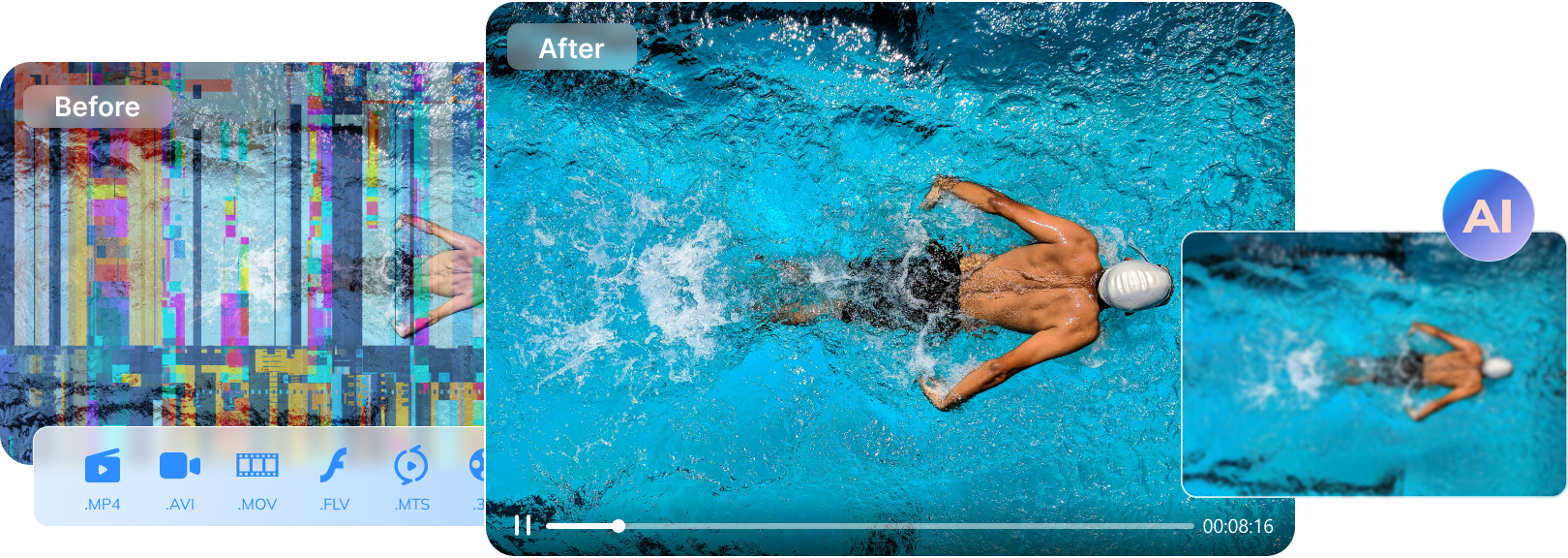



 ChatGPT
ChatGPT
 Perplexity
Perplexity
 Google AI Mode
Google AI Mode
 Grok
Grok
